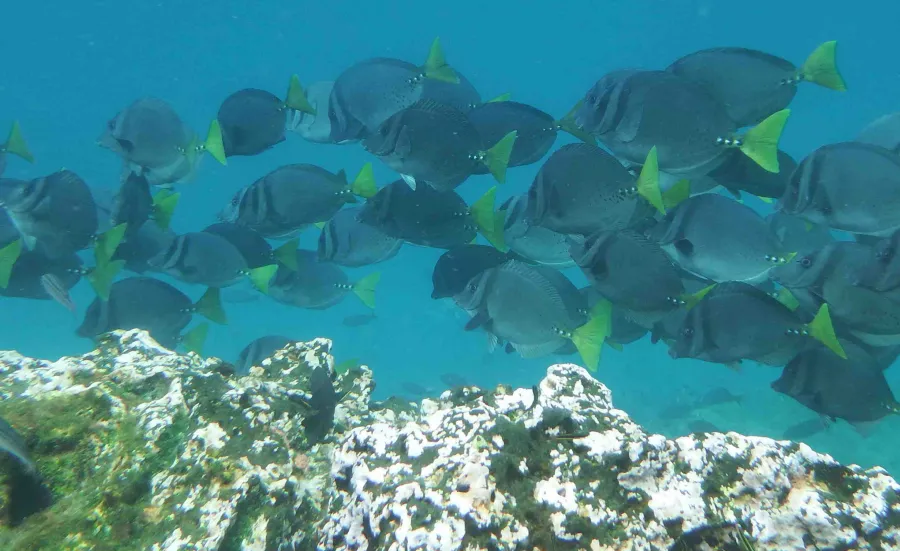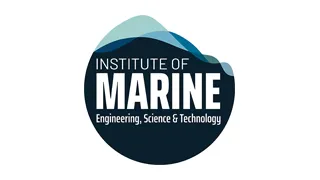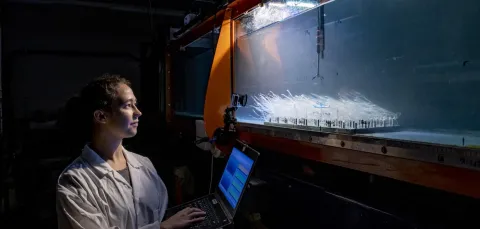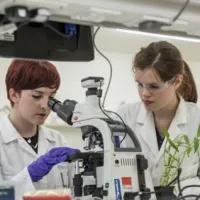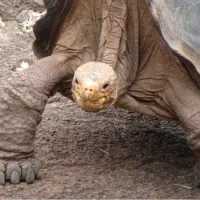About this course
On this biology and marine biology degree, you'll learn about the living world from the molecular level to entire ecosystems. Study through lectures, laboratory work, and fieldwork in the UK and abroad. You'll be prepared for a career in research, conservation, inshore fisheries or habitat management.
This course will give you knowledge and understanding of living organisms at several levels - from the molecular, through cells and whole organisms and ecosystems. You'll also gain an understanding of biology from an evolutionary perspective.
You'll join one of the largest marine science communities in Europe, the National Oceanography Centre Southampton (NOCS). Our research feeds directly into what you'll learn on our biology and marine biology courses.
Our research vessels are a short walk from the lecture theatres, and boat-based fieldwork is an important part of the programme.
You can:
- take part in a fieldwork programme including residential trips at home and abroad
- do independent research project, working with research staff, to prepare for a career in research or a specialised master's
- take modules such as business biosciences, which looks at drug discovery, clinical trials and drug product sales
- learn sought-after skills including team working, time management, planning, data collection, analysis
Practicals which use animals or their tissues are an important part of the course. These practicals follow ethical policies and we'll make adjustments for you if you have valid concerns about taking part.
We regularly review our courses to ensure and improve quality. This course may be revised as a result of this. Any revision will be balanced against the requirement that the student should receive the educational service expected. Find out why, when, and how we might make changes.
Our courses are regulated in England by the Office for Students (OfS).
Learn more about these subject areas
Course locations
This course is based at Waterfront (National Oceanography Centre Southampton) and Highfield.
Awarding body
This qualification is awarded by the University of Southampton.
Download the Course Description Document
The Course Description Document details your course overview, your course structure and how your course is taught and assessed.
Entry requirements
For Academic year 202627
A-levels
ABB including Biology (minimum grade B) and one further science subject
A-levels additional information
Offers typically exclude General Studies and Critical Thinking. Preferred subjects are Chemistry, Physics, Mathematics, Psychology, Statistics, Environmental Science, Environmental Studies, Geography and Geology. Where this offer is satisfied by including grades achieved in either Biology, Chemistry or Physics, a Pass in the practical science assessment is additionally required.
A-levels with Extended Project Qualification
If you are taking an EPQ in addition to 3 A levels, you will receive the following offer in addition to the standard A level offer: BBB including Biology and one other preferred subject, and grade A in the EPQ
A-levels contextual offer
We are committed to ensuring that all applicants with the potential to succeed, regardless of their background, are encouraged to apply to study with us. The additional information gained through contextual data allows us to recognise an applicant's potential to succeed in the context of their background and experience. Applicants who are highlighted in this way will be made an offer which is lower than the typical offer for that programme: Grades BBC
International Baccalaureate Diploma
Pass, with 32 points overall with 16 points at Higher Level, including 5 at Higher Level Biology and one further Higher Level in a preferred subject
International Baccalaureate Diploma additional information
Preferred subjects include Chemistry, Physics, Mathematics, Psychology, Statistics, Environmental Science, Environmental Studies, Geography and Geology
International Baccalaureate contextual offer
We are committed to ensuring that all learners with the potential to succeed, regardless of their background, are encouraged to apply to study with us. The additional information gained through contextual data allows us to recognise a learner’s potential to succeed in the context of their background and experience. Applicants who are highlighted in this way will be made an offer which is lower than the typical offer for that programme.
International Baccalaureate Career Programme (IBCP) statement
Offers will be made on the individual Diploma Course subject(s) and the career-related study qualification. The CP core will not form part of the offer. Where there is a subject pre-requisite(s), applicants will be required to study the subject(s) at Higher Level in the Diploma course subject and/or take a specified unit in the career-related study qualification. Applicants may also be asked to achieve a specific grade in those elements. Please see the University of Southampton International Baccalaureate Career-Related Programme (IBCP) Statement for further information. Applicants are advised to contact their Faculty Admissions Office for more information.
BTEC
RQF BTEC
D in the BTEC Extended Certificate plus AB in A Level Biology and one preferred subject. We do not accept the BTEC National Diploma/ BTEC National Extended Diploma without two AB grades in A Level Biology and one preferred subject,
We are committed to ensuring that all learners with the potential to succeed, regardless of their background, are encouraged to apply to study with us. The additional information gained through contextual data allows us to recognise a learner’s potential to succeed in the context of their background and experience.
Additional information
Preferred subjects are Chemistry, Physics, Mathematics, Psychology, Statistics, Environmental Science, Environmental Studies, Geography and Geology. Where this offer is satisfied by including grades achieved in either Biology, Chemistry or Physics, a Pass in the practical science assessment is additionally required. Offers typically exclude General Studies and Critical Thinking.
QCF BTEC
D in the BTEC Subsidiary Diploma plus AB in A Level Biology and one preferred subject. We do not accept the BTEC Diploma/BTEC Extended Diploma without two AB grades in A Level Biology and one preferred subject.
BTEC contextual
We are committed to ensuring that all learners with the potential to succeed, regardless of their background, are encouraged to apply to study with us. The additional information gained through contextual data allows us to recognise a learner’s potential to succeed in the context of their background and experience.
Access to HE Diploma
60 credits with 45 credits at Level 3, of which 30 credits must be at Distinction and 15 at Merit
Access to HE additional information
A core science Access to HE Diploma to contain Level 3 modules in Biology (to include ecology) and either Chemistry, Physics or Environmental Science and Maths. If you are unsure whether the Access you are studying would be accepted, please contact the Admissions Team before submitting an application.
Access Offer Contextual
We are committed to ensuring that all learners with the potential to succeed, regardless of their background, are encouraged to apply to study with us. The additional information gained through contextual data allows us to recognise a learner’s potential to succeed in the context of their background and experience. Applicants who are highlighted in this way will be made an offer which is lower than the typical offer for that programme.
Irish Leaving Certificate
Irish Leaving Certificate (first awarded 2017)
H1, H2, H2, H2, H3, H3 including Biology at H3 and one preferred subject
Irish certificate additional information
Preferred subjects include Chemistry, Physics, Mathematics, Psychology, Statistics, Environmental Science, Environmental Studies, Geography and Geology. Applicants will be required to have achieved a pass in Mathematics and English at ILC Grade C or O4, the equivalent of GCSE grade C/grade 4.
Irish Offer Contextual
We are committed to ensuring that all learners with the potential to succeed, regardless of their background, are encouraged to apply to study with us. The additional information gained through contextual data allows us to recognise a learner’s potential to succeed in the context of their background and experience. Applicants who are highlighted in this way will be made an offer which is lower than the typical offer for that programme.
Scottish Qualification
Offers will be based on exams being taken at the end of S6. Subjects taken and qualifications achieved in S5 will be reviewed. Careful consideration will be given to an individual’s academic achievement, taking in to account the context and circumstances of their pre-university education.
Please see the University of Southampton’s Curriculum for Excellence Scotland Statement (PDF) for further information. Applicants are advised to contact their Faculty Admissions Office for more information.
Cambridge Pre-U
D3, M2, M2 in three Principal subjects including Biology and one preferred subject
Cambridge Pre-U additional information
Preferred subjects include Chemistry, Physics, Mathematics, Psychology, Statistics, Environmental Science, Environmental Studies, Geography and Geology. Cambridge Pre-U's can be used in combination with other qualifications such as A Levels to achieve the equivalent of the typical offer, where D3 can be used in lieu of A Level grade A or grade M2 can be used in lieu of grade B.
Cambridge Pre-U Offer Contextual
We are committed to ensuring that all learners with the potential to succeed, regardless of their background, are encouraged to apply to study with us. The additional information gained through contextual data allows us to recognise a learner’s potential to succeed in the context of their background and experience. Applicants who are highlighted in this way will be made an offer which is lower than the typical offer for that programme.
Welsh Baccalaureate
ABB from 3 A levels including Biology and one other preferred subject or AB from two A levels including Biology and a further preferred subject and B from the Advanced Skills Baccalaureate Wales
Welsh Baccalaureate additional information
Preferred science subjects; Biology, Chemistry, Physics, Mathematics, Psychology, Statistics, Environmental Science, Environmental Studies, Geography and Geology Where this offer is satisfied by including grades achieved in either Biology, Chemistry or Physics, a Pass in the practical science assessment is additionally required. Offers typically exclude General Studies and Critical Thinking.
Welsh Baccalaureate contextual offer
We are committed to ensuring that all learners with the potential to succeed, regardless of their background, are encouraged to apply to study with us. The additional information gained through contextual data allows us to recognise a learner’s potential to succeed in the context of their background and experience. Applicants who are highlighted in this way will be made an offer which is lower than the typical offer for that programme.
T-Level
Not accepted for this course.
Other requirements
GCSE requirements
Applicants must hold GCSE English Language (or GCSE English), Mathematics and Science at minimum grade C/4.
Find the equivalent international qualifications for our entry requirements.
English language requirements
If English is not your first language, you must show that you can use English to the level we require. Visit our English language pages to find out which qualifications we accept and how you can meet our requirements.
If you are taking the International English Language Testing System (IELTS), you must get at least the following scores:
IELTS score requirements
- overall score
- 6.5
- reading
- 6.0
- writing
- 6.0
- speaking
- 6.0
- listening
- 6.0
If you do not meet the English language requirements through a test or qualification, you may be able to meet them by completing one of our pre-sessional English programmes before your course starts.
You might meet our criteria in other ways if you do not have the qualifications we need. Find out more about:
- skills you might have gained through work or other life experiences (otherwise known as recognition of prior learning)
Find out more about our Admissions Policy.
Science Foundation Year
The Science Foundation Year will give you the skills and knowledge to progress to this course if you don't have the right qualifications for direct entry.
It could be the right option if you:
- are studying for A levels in subjects other than those we normally ask for
- are a mature applicant with skills and experience from employment and can show recent study
- you come from a part of the world where the education system is different from the British A level system
Find full details on our Science Foundation Year page.
Foundation programmes for international students
A foundation programme will give you the language skills and subject knowledge you need if you're not qualified for direct entry to your chosen undergraduate course.
You'll progress to your chosen course after successfully completing the foundation programme.
Find out more about undergraduate foundation programmes for international students.
Mature applicants
We welcome applications from learners of all ages. Students who are aged 21 and over at the start of their undergraduate course are defined as mature by the University of Southampton. We take a holistic assessment of the application looking for academic ability and commitment to study. Typical entry requirements, which may vary from discipline to discipline, includes for example, evidence of recent formal academic qualifications or professional qualifications, relevant work experience or volunteering. You may also be invited to attend an interview with an Admissions Tutor. For some degree programmes, there may also be a Professional, Statutory and Regulatory Body (PSRB) requirement. We accept many different academic qualifications. For more information, please contact the Admissions Team.
Got a question?
Please contact our enquiries team if you're not sure that you have the right experience or qualifications to get onto this course.
Email: enquiries@southampton.ac.uk
Tel: +44(0)23 8059 5000
Course structure
There are core, compulsory and optional modules in each year. You'll undertake a balanced programme of modules spilt 50/50 between terrestrial and marine topics. Year 1 lays the foundations of the course with the opportunity to specialise later on. You don't need to select your modules when you apply. Your academic tutor will help you to customise your course.
Year 1 overview
You'll cover topics introducing you to marine animals and plants; their ecology, taxonomy and physiology. You'll also develop an understanding of the physical and chemical oceanography of the sea supported by practicals and boat work.
Optional modules allow you study topics such as marine invertebrates or the types of macromolecule that constitute living cells.
Year 2 overview
A compulsory module covers evolutionary processes, while optional modules allow you to develop your practical skills. You can choose to carry out fieldwork in coastal ecology, learn quantitative research methods in environmental science or laboratory work in molecular biology.
Further optional modules cover topics including neuroscience, cell biology and marine vertebrates.
Year 3 overview
You'll carry out either a laboratory-based, field-based, computer-based or marine science research project. This is an opportunity for you show that you can undertake independent study.
A compulsory fieldwork module will develop your skills in shallow water biological survey techniques, using a range of methods from transect surveys to a remotely operated vehicle (ROV).
Further optional modules allow you to specialise in areas such as:
- zooplankton
- biodiversity
- marine conservation
- deep sea ecology
Want more detail? See all the modules in the course.
Modules
The modules outlined provide examples of what you can expect to learn on this degree course based on recent academic teaching. As a research-led University, we undertake a continuous review of our course to ensure quality enhancement and to manage our resources. The precise modules available to you in future years may vary depending on staff availability and research interests, new topics of study, timetabling and student demand. Find out why, when and how we might make changes.
For entry in academic year 2026 to 2027
Year 1 modules
You must study the following modules in year 1:
Earth and Ocean System
An introduction to the fundamental processes which determine the environment of the Earth and the general functioning of the Earth as a system.
How to be Scientifically Literate
Scientific literacy refers to the ability of individuals to understand, evaluate, and engage with scientific information and concepts in a meaningful way. It involves not only knowing scientific facts but also understanding the processes of scientific inq...
Marine Invertebrates
An exciting journey through the weird and wonderful world of marine invertebrates. You will learn how to identify key representatives of the marine invertebrate phyla and understand how their characteristic body plans allow them to thrive in habitats that...
Origins of Biodiversity
In this module you will explore and explain patterns of global biodiversity over space and time, affecting a wide variety of lineages. We will begin as 18th century natural historians, considering the impact of new discoveries, due to the invention of the...
Year 2 modules
You must study the following modules in year 2:
Animal Behaviour
This module provides an introduction to the study of animal behaviour taking an integrative approach that addresses animal behaviour from ethological, ecological and evolutionary angles and to review the basic concepts of behaviour as a science.
Coastal Ecology Field Course
The aims of the module are to: 1. Understand basic ecological principles relating to shore ecology; 2. Use keys to identify fauna and macro algae; 3. Design, plan and implement a research project based on intertidal community ecology; 4. Appreciate...
Evolution
The module seeks to: - explore the main evolutionary processes - consider evolution at the phenotypic as well as the molecular level - consider evolutionary processes occurring at different time scales
Marine Benthic Ecology
Phytoplankton and Primary Production
Population and Community Ecology
This module builds on the basic principles of ecology introduced in year 1, to achieve a broad appreciation of current theory and practice in population and community ecology. Lectures and practicals will explore the processes involved in the dynamic func...
You must also choose from the following modules in year 2:
Behaviour and Ecology Field Course
A week-long field course held in Bolonia on the Andalucian coast of Southern Spain, within the Estrecho natural park. The field course will take place during the Easter holidays, when there is a large diversity of flora and fauna to survey. As a residenti...
Marine Vertebrates
Palaeobiology
This module will deliver a comprehensive analysis of the cutting-edge topics associated with the fields of Palaeobiology and Palaeontology. We will cover topics focusing on the role of the fossil record in understanding past, present, and future ecosyste...
Plant Development and Function
This module provides an understanding of plant function and development at a molecular, cellular and whole organism level.
Zooplankton Ecology and Processes
This module introduces the biodiversity, distribution and role of zooplankton in marine food webs, building on previous modules in the 1st year and semester 1 of the 2nd year. It will be taught via in-person lectures, workshops, laboratory and computer pr...
Year 3 modules
You must study the following modules in year 3:
Bioscience Business
The aim of this module is to provide third year students with an introduction to commercialization of biosciences. The current focus is on the process of drug discovery, the subsequent management of clinical trials and marketing of commercial drug product...
Bioscience Education
The students will be expected to carry out an in-depth literature review into a biological concept or topic in semester 1, and to then design an innovative educational activity to convey their research to groups of people in semester 2.
Field Research Project
Each student undertakes an investigation which includes both practical and theoretical components. The theory component will consist of a critical review of the literature relating to the proposed experimental component of the project. The fieldwork is re...
Global Challenges in Biology
This module will consider human-caused global challenges and their impact on marine and terrestrial ecosystems. We will discuss the main causes of global change, including greenhouse gases, changes in temperature and rainfall, and human land use, as well ...
In-Silico Research Project
Each student undertakes an investigation which includes both practical and theoretical components. The theory component will consist of a critical review of the literature relating to the proposed experimental/analytical component of the project. The topi...
Independent Research Project
The Independent Research Project, or Dissertation, forms an extremely important part of the overall degree. This module represents an extended opportunity to develop independent real-world and applied research skills, in design, execution, analysis and sy...
Laboratory Research Project
Each student undertakes an investigation which includes both practical and theoretical components. The theory component will consist of a critical review of the literature relating to the proposed experimental component of the project. The laboratory work...
Shallow Water Survey Techniques
Biologists are often required to provide quantitative analyses of field data typically collected under imperfectly controlled conditions and across heterogeneous habitats. This module will develop generic skills in (1) the design of data collection protoc...
You must also choose from the following modules in year 3:
Applied Plant Biology
This module provides a broad introduction to the applied use of plants in the modern world. The module will cover the production of transgenic (GM) plants and their applications in a variety of areas including medical biotechnology, nutrition, phytoremedi...
Behavioural Ecology
Behavioural ecology considers the evolutionary pressures that shape behaviour. This module will explore animal behaviours from evolutionary biology and population ecological perspectives. Each week, lectures will consider a different behavioural ecology t...
Biodiversity and Conservation
This module concerns global biodiversity, what we understand by it and why it is in crisis, and current efforts to conserve and manage it. We begin with an appraisal of different values of diversity at scales from genetic to species, communities and ecosy...
Deep Sea Ecology
This module examines the patterns of life in deep-sea environments & the processes that govern those patterns.
Evolution and Development
This module will deliver a comprehensive analysis of the topics associated with evolutionary developmental biology. This will involve exploring the theory of evolution; embryology and molecular pathways of development; what the fossil record tells us abou...
Evolution and Genetics
Evolutionary processes impact on individuals, populations, and communities. Evolution typically happens over long time periods, but this is not always the case. Strong selection can result in rapid evolution. This is underpinned by understanding the genet...
Marine Conservation and Policy
This module is only open to Year 3 students registered on MSci Biology and Marine Biology, BSc Biology and Marine Biology, BSc Marine Biology with Oceanography, MSci Marine Biology and Oceanography, MSci Marine Biology and BSc Marine Biology degrees. MSc ...
Marine Fisheries Ecology
Marine Microbial Ecology and Biotechnology
This module looks at the roles of marine microbes in the ecosystems as well as in biogeochemical cycling - how they interact with each other, with multicellular organisms and the environments - especially through the use of modern molecular biological too...
Seascape Ecology
This course focuses on understanding the causes and ecological consequences of seascape patterns and processes in space and time. A central theme will be the movements of marine organisms and their interaction with dynamic environments at different scales...
Understanding Coral Reefs
This module is only open to year 3 students registered on MSci Biology and Marine Biology, BSc Biology and Marine Biology, BSc Marine Biology with Oceanography, MSci Marine Biology and Oceanography, Msci Marine Biology and BSc Marine Biology degrees.
Learning and assessment
The learning activities for this course include the following:
- lectures
- classes and tutorials
- coursework
- individual and group projects
- independent learning (studying on your own)
Course time
How you'll spend your course time:
Year 1
Study time
Your scheduled learning, teaching and independent study for year 1:
How we'll assess you
- coursework, laboratory reports and essays
- essays
- individual and group projects
- oral presentations
- written exams
Your assessment breakdown
Year 1:
Year 2
Study time
Your scheduled learning, teaching and independent study for year 2:
How we'll assess you
- coursework, laboratory reports and essays
- essays
- individual and group projects
- oral presentations
- written exams
Your assessment breakdown
Year 2:
Year 3
Study time
Your scheduled learning, teaching and independent study for year 3:
How we'll assess you
- coursework, laboratory reports and essays
- essays
- individual and group projects
- oral presentations
- written exams
Your assessment breakdown
Year 3:
Academic support
You’ll be supported by a personal academic tutor and have access to a senior tutor.
Course leader
Phillip Fenberg is the course leader.
Careers and employability
Employability skills
This degree will allow you to develop and evidence subject-specific and targeted employability skills. This includes the required skill set for a range of future careers, further study, or starting your own business.
The skills you can expect to focus on and gain from this course include:
- Research
- Critical thinking
- Self-management
- Communication
- Teamwork
The employability and enterprise skills you'll gain from this course are reflected in the Southampton skills model. When you join us you'll be able to use our skills model to track, plan, and benefit your career development and progress.
Download skills overview
Career pathways
Graduates commonly work in a range of organisations or sectors including:
Laboratories,
Charities,
Government Organisations,
Think Tanks,
Higher education,
Ocean Survey companies,
Renewable energy organisations,
Port and harbour authorities,
DEFRA,
The Environment Agency,
Higher education,
Marine monitoring organisations,
Local authorities.
- Marine ecologist
- Reef restoration project manager
- Aquaculture biologist
- Environmental engineer
- Oil spill response specialist
- Marine biotechnologist
- Marine policy expert
- Consultant in marine ecology
- Marine conservation officer
- Marine biologist
- Marine scientist
- Fishery data manager
- Nature Conservation officer
- Science writer
- Geophysicist
- Hydrogeologist
- Meteorologist
- Research scientist
- Scientific laboratory technician
- Water quality scientist
- Programme officer
- Decision science analyst
- Sustainability executive
- Environmental consultant
- Field studies tutor
- Hydrographic surveyor
- Marine biologist and aquarist
- Marine laboratory scientist
- Wildlife guide
- Environmental manager
Job prospects for BSc Biology and Marine Biology graduates
*Example graduate job titles and job prospect statistics taken from The Graduate Outcomes Survey, which gathers information about the activities and perspectives of graduates 15 months after finishing their course.

Work experience opportunities
Choosing to do work experience is a great way to enhance your employability, build valuable networks, and evidence your potential. Learn about the different work and industry experience options at Southampton.
Careers services and support
We are a top 20 UK university for employability (QS Graduate Employability Rankings 2022). Our Careers, Employability and Student Enterprise team will support you. This support includes:
- work experience schemes
- CV and interview skills and workshops
- networking events
- careers fairs attended by top employers
- a wealth of volunteering opportunities
- study abroad and summer school opportunities
We have a vibrant entrepreneurship culture and our dedicated start-up supporter, Futureworlds, is open to every student.
Your career ideas and graduate job opportunities may change while you're at university. So it is important to take time to regularly reflect on your goals, speak to people in industry and seek advice and up-to-date information from Careers, Employability and Student Enterprise professionals at the University.
Fees, costs and funding
Tuition fees
Fees for a year's study:
- UK students pay £9,535.
- EU and international students pay £30,300.
What your fees pay for
Your tuition fees pay for the full cost of tuition and standard exams.
Find out how to:
Accommodation and living costs, such as travel and food, are not included in your tuition fees. There may also be extra costs for retake and professional exams.
Explore:
Bursaries, scholarships and other funding
If you're a UK or EU student and your household income is under £36,200 a year, you may be able to get a University of Southampton bursary to help with your living costs. Find out about bursaries and other funding we offer at Southampton.
If you're a care leaver or estranged from your parents, you may be able to get a specific bursary.
Get in touch for advice about student money matters.
Scholarships and grants
You may be able to get a scholarship or grant to help fund your studies.
We award scholarships and grants for travel, academic excellence, or to students from under-represented backgrounds.
Support during your course
The Student Hub offers support and advice on money to students. You may be able to access our Student Support fund and other sources of financial support during your course.
Funding for EU and international students
Find out about funding you could get as an international student.
How to apply
What happens after you apply?
We will assess your application on the strength of your:
- predicted grades
- academic achievements
- personal statement
- academic reference
We'll aim to process your application within 2 to 6 weeks, but this will depend on when it is submitted. Applications submitted in January, particularly near to the UCAS equal consideration deadline, might take substantially longer to be processed due to the high volume received at that time.
Equality and diversity
We treat and select everyone in line with our Equality and Diversity Statement.
Got a question?
Please contact our enquiries team if you're not sure that you have the right experience or qualifications to get onto this course.
Email: enquiries@southampton.ac.uk
Tel: +44(0)23 8059 5000
Related courses
Biology and Marine Biology (BSc) is a course in the Biological sciences and Ocean and Earth science subject areas. Here are some other courses within these subject areas:
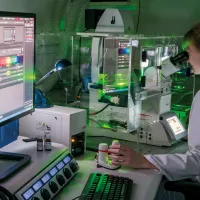
Biochemistry
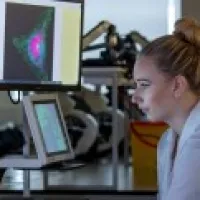
Biochemistry
Biology
Biology
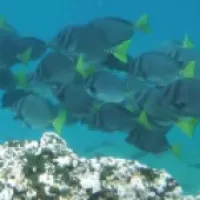
Biology and Marine Biology
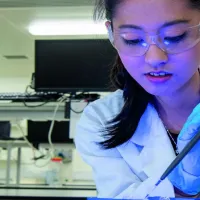
Biomedical Sciences

Biomedical Sciences
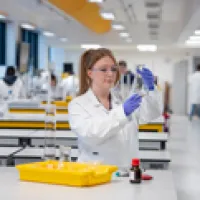
Chemistry with Medicinal Chemistry

Chemistry with Medicinal Chemistry
Microbiology
Microbiology
-
Study
- View all courses
- Taught postgraduate study
- Pre-sessional English courses
-
Subjects
- Acoustical engineering
- Aeronautical and astronautical engineering
- Ageing and gerontology
- Archaeology
- Art, design and fashion
- Audiology
- Biological sciences
- Biomedical and medical engineering
- Business, accounting, finance and marketing
- Chemistry
- Civil engineering
- Computer science and software engineering
- Economics
- Education
- Electrical and electronic engineering
- English
- Film studies
- French
- Geography and environmental science
- History
- Languages and linguistics
- Law
- Maritime engineering
- Mathematical sciences
- Mechanical engineering
- Medicine
- Music
- Nursing, midwifery and healthcare
- Ocean and Earth science
- Philosophy
- Photonics and optoelectronics
- Physics and astronomy
- Politics and international relations
- Psychology
- Social statistics and demography
- Sociology, social policy and criminology
-
PhDs and research degrees
- Create your own research project
-
Find a PhD project
- A missing link between continental shelves and the deep sea: Have we underestimated the importance of land-detached canyons?
- A study of rolling contact fatigue in electric vehicles (EVs)
- Acoustic monitoring of forest exploitation to establish community perspectives of sustainable hunting
- Acoustic sensing and characterisation of soil organic matter
- Advancing intersectional geographies of diaspora-led development in times of multiple crises
- Aero engine fan wake turbulence – Simulation and wind tunnel experiments
- Against Climate Change (DACC): improving the estimates of forest fire smoke emissions
- All-in-one Mars in-situ resource utilisation (ISRU) system and life-supporting using non-thermal plasma
- An electromagnetic study of the continent-ocean transition southwest of the UK
- An investigation of the relationship between health, home and law in the context of poor and precarious housing, and complex and advanced illness
- Antibiotic resistance genes in chalk streams
- Being autistic in care: Understanding differences in care experiences including breakdowns in placements for autistic and non-autistic children
- Biogeochemical cycling in the critical coastal zone: Developing novel methods to make reliable measurements of geochemical fluxes in permeable sediments
- Bloom and bust: seasonal cycles of phytoplankton and carbon flux
- British Black Lives Matter: The emergence of a modern civil rights movement
- Building physics for low carbon comfort using artificial intelligence
- Business studies and management: accounting
- Business studies and management: banking and finance
- Business studies and management: decision analytics and risk
- Business studies and management: digital and data driven marketing
- Business studies and management: human resources (HR) management and organisational behaviour
- Business studies and management: strategy, innovation and entrepreneurship
- Carbon storage in reactive rock systems: determining the coupling of geo-chemo-mechanical processes in reactive transport
- Cascading hazards from the largest volcanic eruption in over a century: What happened when Hunga Tonga-Hunga Ha’apai erupted in January 2022?
- Characterisation of cast austenitic stainless steels using ultrasonic backscatter and artificial intelligence
- Climate Change effects on the developmental physiology of the small-spotted catshark
- Climate at the time of the Human settlement of the Eastern Pacific
- Collaborative privacy in data marketplaces
- Compatibility of climate and biodiversity targets under future land use change
- Cost of living in modern and fossil animals
- Creative clusters in rural, coastal and post-industrial towns
- Deep oceanic convection: the outsized role of small-scale processes
- Defect categories and their realisation in supersymmetric gauge theory
- Defining the Marine Fisheries-Energy-Environment Nexus: Learning from shocks to enhance natural resource resilience
- Design and fabrication of next generation optical fibres
- Developing a practical application of unmanned aerial vehicle technologies for conservation research and monitoring of endangered wildlife
- Development and evolution of animal biomineral skeletons
- Development of all-in-one in-situ resource utilisation system for crewed Mars exploration missions
- Ecological role of offshore artificial structures
- Effect of embankment and subgrade weathering on railway track performance
- Efficient ‘whole-life’ anchoring systems for offshore floating renewables
- Electrochemical sensing of the sea surface microlayer
- Engagement with nature among children from minority ethnic backgrounds
- Enhancing UAV manoeuvres and control using distributed sensor arrays
- Ensuring the Safety and Security of Autonomous Cyber-Physical Systems
- Environmental and genetic determinants of Brassica crop damage by the agricultural pest Diamondback moth
- Estimating marine mammal abundance and distribution from passive acoustic and biotelemetry data
- Evolution of symbiosis in a warmer world
- Examining evolutionary loss of calcification in coccolithophores
- Explainable AI (XAI) for health
- Explaining process, pattern and dynamics of marine predator hotspots in the Southern Ocean
- Exploring dynamics of natural capital in coastal barrier systems
- Exploring the mechanisms of microplastics incorporation and their influence on the functioning of coral holobionts
- Exploring the potential electrical activity of gut for healthcare and wellbeing
- Exploring the trans-local nature of cultural scene
- Facilitating forest restoration sustainability of tropical swidden agriculture
- Faulting, fluids and geohazards within subduction zone forearcs
- Faulting, magmatism and fluid flow during volcanic rifting in East Africa
- Fingerprinting environmental releases from nuclear facilities
- Flexible hybrid thermoelectric materials for wearable energy harvesting
- Floating hydrokinetic power converter
- Glacial sedimentology associated subglacial hydrology
- Green and sustainable Internet of Things
- How do antimicrobial peptides alter T cell cytokine production?
- How do calcifying marine organisms grow? Determining the role of non-classical precipitation processes in biogenic marine calcite formation
- How do neutrophils alter T cell metabolism?
- How well can we predict future changes in biodiversity using machine learning?
- Hydrant dynamics for acoustic leak detection in water pipes
- If ‘Black Lives Matter’, do ‘Asian Lives Matter’ too? Impact trajectories of organisation activism on wellbeing of ethnic minority communities
- Illuminating luciferin bioluminescence in dinoflagellates
- Imaging quantum materials with an XFEL
- Impact of neuromodulating drugs on gut microbiome homeostasis
- Impact of pharmaceuticals in the marine environment in a changing world
- Improving subsea navigation using environment observations for long term autonomy
- Information theoretic methods for sensor management
- Installation effect on the noise of small high speed fans
- Integrated earth observation mapping change land sea
- Interconnections of past greenhouse climates
- Investigating IgG cell depletion mechanisms
- Is ocean mixing upside down? How mixing processes drive upwelling in a deep-ocean basin
- Landing gear aerodynamics and aeroacoustics
- Lightweight gas storage: real-world strategies for the hydrogen economy
- Machine learning for multi-robot perception
- Machine learning for multi-robot perception
- Marine ecosystem responses to past climate change and its oceanographic impacts
- Mechanical effects in the surf zone - in situ electrochemical sensing
- Microfluidic cell isolation systems for sepsis
- Migrant entrepreneurship, gender and generation: context and family dynamics in small town Britain
- Miniaturisation in fishes: evolutionary and ecological perspectives
- Modelling high-power fibre laser and amplifier stability
- Modelling soil dewatering and recharge for cost-effective and climate resilient infrastructure
- Modelling the evolution of adaptive responses to climate change across spatial landscapes
- Nanomaterials sensors for biomedicine and/or the environment
- New high-resolution observations of ocean surface current and winds from innovative airborne and satellite measurements
- New perspectives on ocean photosynthesis
- Novel methods of detecting carbon cycling pathways in lakes and their impact on ecosystem change
- Novel technologies for cyber-physical security
- Novel transparent conducting films with unusual optoelectronic properties
- Novel wavelength fibre lasers for industrial applications
- Ocean circulation and the Southern Ocean carbon sink
- Ocean influence on recent climate extremes
- Ocean methane sensing using novel surface plasmon resonance technology
- Ocean physics and ecology: can robots disentangle the mix?
- Ocean-based Carbon Dioxide Removal: Assessing the utility of coastal enhanced weathering
- Offshore renewable energy (ORE) foundations on rock seabeds: advancing design through analogue testing and modelling
- Optical fibre sensing for acoustic leak detection in buried pipelines
- Optimal energy transfer in nonlinear systems
- Optimal energy transfer in nonlinear systems
- Optimizing machine learning for embedded systems
- Oxidation of fossil organic matter as a source of atmospheric CO2
- Partnership dissolution and re-formation in later life among individuals from minority ethnic communities in the UK
- Personalized multimodal human-robot interactions
- Preventing disease by enhancing the cleaning power of domestic water taps using sound
- Quantifying riparian vegetation dynamics and flow interactions for Nature Based Solutions using novel environmental sensing techniques
- Quantifying the response and sensitivity of tropical forest carbon sinks to various drivers
- Quantifying variability in phytoplankton electron requirements for carbon fixation
- Resilient and sustainable steel-framed building structures
- Resolving Antarctic meltwater events in Southern Ocean marine sediments and exploring their significance using climate models
- Robust acoustic leak detection in water pipes using contact sound guides
- Silicon synapses for artificial intelligence hardware
- Smart photon delivery via reconfigurable optical fibres
- The Gulf Stream control of the North Atlantic carbon sink
- The Mayflower Studentship: a prestigious fully funded PhD studentship in bioscience
- The calming effect of group living in social fishes
- The duration of ridge flank hydrothermal exchange and its role in global biogeochemical cycles
- The evolution of symmetry in echinoderms
- The impact of early life stress on neuronal enhancer function
- The oceanic fingerprints on changing monsoons over South and Southeast Asia
- The role of iron in nitrogen fixation and photosynthesis in changing polar oceans
- The role of singlet oxygen signaling in plant responses to heat and drought stress
- Time variability on turbulent mixing of heat around melting ice in the West Antarctic
- Triggers and Feedbacks of Climate Tipping Points
- Uncovering the drivers of non-alcoholic fatty liver disease progression using patient derived organoids
- Understanding recent land-use change in Snowdonia to plan a sustainable future for uplands: integrating palaeoecology and conservation practice
- Understanding the role of cell motility in resource acquisition by marine phytoplankton
- Understanding the structure and engagement of personal networks that support older people with complex care needs in marginalised communities and their ability to adapt to increasingly ‘digitalised’ health and social care
- Unpicking the Anthropocene in the Hawaiian Archipelago
- Unraveling oceanic multi-element cycles using single cell ionomics
- Unravelling southwest Indian Ocean biological productivity and physics: a machine learning approach
- Using acoustics to monitor how small cracks develop into bursts in pipelines
- Using machine learning to improve predictions of ocean carbon storage by marine life
- Vulnerability of low-lying coastal transportation networks to natural hazards
- X-ray imaging and property characterisation of porous materials
- Funding your research degree
- How to apply for a PhD or research degree
- How to make a PhD enquiry
- Support while studying your PhD or research degree
- Exchanges and studying abroad
- Undergraduate study
-
Tuition fees, funding and scholarships
- Fee status
- Scholarships
- Undergraduate funding options
-
Postgraduate funding options
-
Postgraduate scholarships
- Black Futures Postgraduate Research Scholarships (Environmental and Life Sciences)
- Black Futures scholarship
- China Excellence Scholarship
- GREAT Scholarships 2025 – Egypt
- GREAT Scholarships 2025 – France
- GREAT Scholarships 2025 – Ghana
- Horizon Europe fee waiver
- India Excellence Scholarship
- Nigeria Excellence Scholarship
- Nursing Global Impact Scholarship
- Postgraduate Taught Diversity Scholarship (Environmental and Life Sciences)
- Social Impact Scholarships
- Southampton Business School (MSc) Dean Scholarship (UK)
- Southampton Faculty of Medicine PGT Talent Scholarship
- Southampton History Patricia Mather and Helen Patterson Scholarship
- Southampton MA Holocaust scholarships
- Southampton Philosophy David Humphris-Norman Scholarship
- Southampton Philosophy MA Scholarship
- Southampton Photonics Impact Scholarship
- Southampton UK Alumni Music Scholarship
- Study in Art and Media Technology Scholarship
- Thailand Excellence Scholarship
- The National Institute for Health and care Research South Central INSIGHT Programme
- The South Coast Doctoral Training Partnership Social Science PhD Studentships
- Vietnam Excellence Scholarship
- Spärck AI Scholarship
-
Postgraduate scholarships
-
International funding options
-
Scholarships for international students
- Engineering Global Talent Scholarship
- Higher Education Scholarships for Palestinians - HESPAL
- Medical Technology, Innovation and Design Master’s Scholarship
- Merit scholarships for international undergraduates
- Presidential bursaries
- Winchester School of Art Postgraduate Global Talent Scholarship
- Becas Chile Scholarship
- Chevening Scholarships
- China Scholarship Council Scholarships
- COLFUTURO Scholarships
- Commonwealth Distance Learning Scholarships
- Commonwealth Master's Scholarships
- Commonwealth PhD Scholarships
- Commonwealth PhD Scholarships for high income countries
- Commonwealth Shared Scholarships
- Excellence Scholarship
- FIDERH Scholarships
- Southampton Education Civic Scholarship
- Fulbright Awards
- Southampton Ageing and Gerontology Talent Scholarship
- Southampton Teachers' Postgraduate Scholarship
- FUNED Scholarships
- Great Scholarships 2024 – Mexico
- Great Scholarships 2024 – Nigeria
- Marshall Scholarship
- Saïd Foundation Scholarships
- Southampton Canadian Prestige Scholarship for Law
- Xiamen University PhD Scholarships
- GREAT scholarships 2026 – Indonesia
-
Scholarships for international students
- External funding opportunities
- Short courses
- Lunchtime evening and weekend courses
- Clearing
- Summer schools
- Get a prospectus
- Student life
-
Research
- Our impact
- Research projects
- Research areas
- Research facilities
- Collaborate with us
-
Institutes, centres and groups
- Active Living
- Advanced Fibre Applications
- Advanced Laser Laboratory
- Advanced Project Management Research Centre
- Antibody and Vaccine Group
- Astronomy Group
- Autism Community Research Network @ Southampton (ACoRNS)
- Bioarchaeology and Osteoarchaeology at Southampton (BOS)
- Bladder and Bowel Management
- Cell and Developmental Biology
- Centre for Defence and Security Research
- Centre for Developmental Origins of Health and Disease
- Centre for Digital Finance
- Centre for Eastern European and Eurasian Studies (CEEES)
- Centre for Empirical Research in Finance and Banking (CERFIB)
- Centre for Geometry, Topology, and Applications
- Centre for Global Health and Policy (GHaP)
- Centre for Green Maritime Innovation (cGMI)
- Centre for Health Technologies
- Centre for Healthcare Analytics
- Centre for Human Development, Stem Cells and Regeneration
- Centre for Imperial and Postcolonial Studies
- Centre for Inclusive and Sustainable Entrepreneurship and Innovation (CISEI)
- Centre for International Film Research (CIFR)
- Centre for International Law and Globalisation
- Centre for Internet of Things and Pervasive Systems
- Centre for Justice Studies
- Centre for Linguistics, Language Education and Acquisition Research
- Centre for Machine Intelligence
- Centre for Maritime Archaeology
- Centre for Medieval and Renaissance Culture (CMRC)
- Centre for Political Ethnography (CPE)
- Centre for Research in Accounting, Accountability and Governance
- Centre for Research on Work and Organisations
- Centre for Resilient Socio-Technical Systems
- Centre for Transnational Studies
- Child and Adolescent Research Group
- Clinical Ethics, Law and Society (CELS)
- Clinical Legal Education
- Computational Nonlinear Optics
- Cyber Security Academy
- Data Science Group
- Digital Oceans
- EPSRC and MOD Centre for Doctoral Training in Complex Integrated Systems for Defence and Security
- Economic Theory and Experimental Economics
- Economy, Society and Governance
- Electrical Power Engineering
- Environmental Hydraulics
- Gas Photonics in Hollow Core Fibres
- Geochemistry
- Global Health (Demography)
- Global Health Community of Practice
- Gravity group
- High Power Fibre Lasers
- Hollow Core Fibre
- Human Genetics and Genomic Medicine
- Infection
- Infrastructure Group
- Institute of Developmental Sciences
- Institute of Maritime Law (IML)
- Integrated Photonic Devices
- Interdisciplinary Musculoskeletal Health
- International Centre for Ecohydraulics Research (ICER)
- Language Assessment and Testing Unit (LATU)
- Laser-Direct-Write (LDW) Technologies for Biomedical Applications
- Law and Technology Centre
- Long Term Conditions
- Magnetic Resonance
- Mathematical Modelling
- Medicines Management
- Molecular and Precision Biosciences
- Multiwavelength Accretion and Astronomical Transients
- National Biofilms Innovation Centre (NBIC)
- National Centre for Research Methods
- National Infrastructure Laboratory
- Nature-Based Ocean Solutions
- Nonlinear Semiconductor Photonics
- Ocean Perception Group
- Operational Research
- Optical Engineering and Quantum Photonics Group
- Paediatrics and Child Health - Clinical and Experimental Sciences
- People, Property, Community
- Photonic Systems, Circuits and Sensors Group
- Physical Optics
- Primary Care Research Centre
- Quantum, Light and Matter Group
- Silica Fibre Fabrication
- Silicon Photonics
- Skin Sensing Research Group
- Southampton Ethics Centre
- Southampton Health Technology Assessments Centre (SHTAC)
- Southampton High Energy Physics group
- Southampton Imaging
- Southampton Theory Astrophysics and Gravity (STAG) Research Centre
- Stefan Cross Centre for Women, Equality and Law
- String theory and holography
- The India Centre for Inclusive Growth and Sustainable Development
- The Parkes Institute
- Tony Davies High Voltage Laboratory
- Ultrafast X-ray Group
- Vision Science
- WSA Exchange
- Work Futures Research Centre (WFRC)
- Support for researchers
- Faculties, schools and departments
- Interdisciplinary research
- Find people and expertise
- Research jobs
- Business
- Global
- About
- Visit
- Alumni
- Departments
- News
- Events
- Contact
